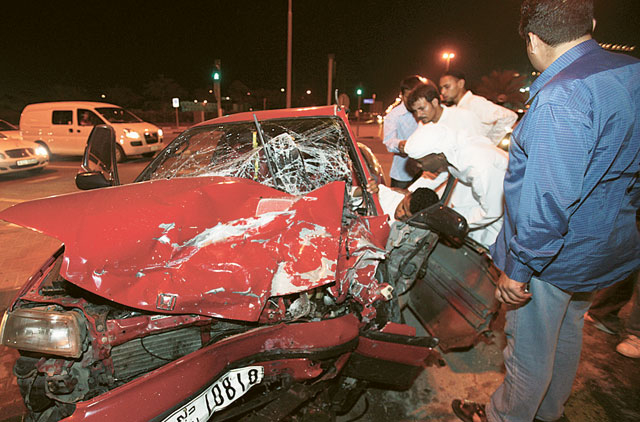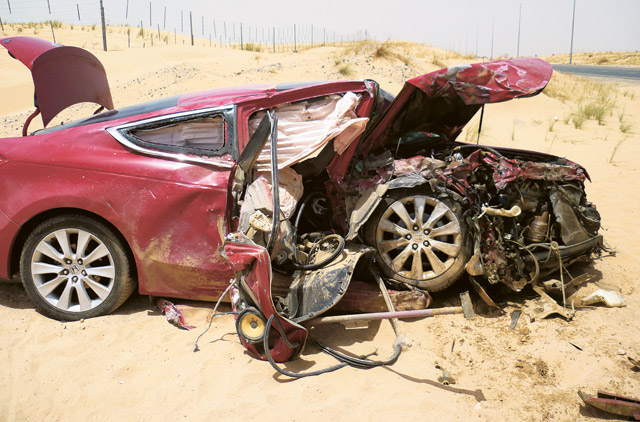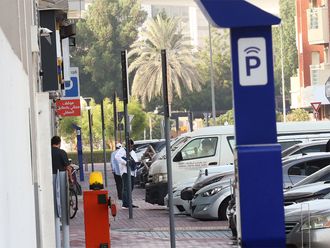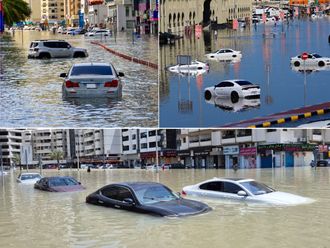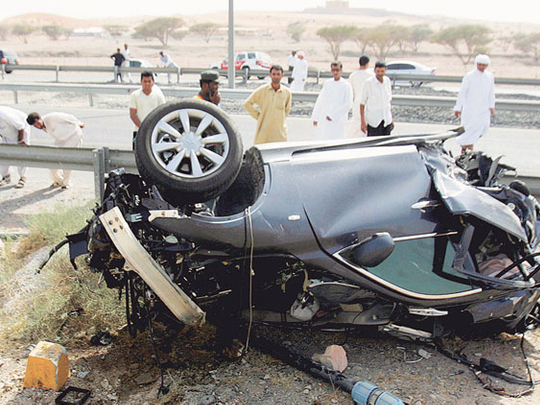
Dubai: It's a horrifying question, but it still needs to be asked.
If you live in Dubai, what's your most likely cause of death? Cancer? Diabetes? Tuberculosis? Old age?
All likely suspects, but the answer is death in a road accident. Death waits for its chance, every time you step on the throttle. But if you have the nerve to drive fast, then you ought to also have the nerve to consider the dreadful consequences of mixing petrol with speed.
In pictures: Anatomy of a car crash
List of violations, fines and black points (pdf)
Shattered lives after traffic accidents
Road accidents kill 3,500 around the world each day — that's 504 more than the official death toll from the 9/11 attacks on the Twin Towers and the Pentagon.
In the UAE, almost as many people die of it every year as anything else. The country has the highest rate of road fatalities in the Middle East and one of the highest rates in the world.
In Dubai, road accidents have claimed 1,534 lives since 2005. From January to October this year alone, the standard everyday sequel to the modern passion for speeding and taking a chance or two have killed 124 and injured over 1,700 in Dubai.
But since statistics exclude the pain and horror an accident causes in its wake, motorists are never able to translate dry figures into a savage reality of blood and agony.
They caress the bonnet of their vehicles and say appreciatively: "It makes 150km an hour feels like nothing." What these morons don't realise is that 150 km/h is almost 137 feet a second - a speed which puts a cruel responsibility on human reflexes.
A split-second lapse in concentration and they end up occupying a few inches of column space in the following morning's newspaper, eliciting nothing more than a perfunctory tut-tut.
In a bid to jolt motorists to a reality of what speeding can lead to and to cut road fatalities by 25 per cent by 2020, Dubai Police, on November 1, launched a two-month-long campaign called Speed Kills. Leaflets are being distributed and police patrol cars have been plastered with the picture of a child crying against the backdrop of a car crash.
It's a chilling image, but it doesn't quite accurately portray the fallout of reckless driving.
No safety poster in the world could do that. Because that poster, as J.C. Furnas said in his famous article, Sudden Death, will have to include motion pictures and sound effects too - the hopeless efforts of the injured to stand up - the grunting noises a victim makes when the shock wears off and the pain creeps in.
It should portray the slack expression of a man staring at the Z twist in his broken leg… Minor details will have to include raw ends of bones protruding through flesh in multiple fractures and the dark oozing blood on surfaces where clothes and skin were flayed off at once.
Major General Mohammad Saif Al Zafein, Dubai Police's Director of Traffic Department, described the grisly scene at an accident that occurred many years ago but continues to haunt him till this day.
"It was an SUV that went up in flames after a high speed crash. The fetid stench of burnt human flesh hung in the air as we approached the spot on Shaikh Zayed Road. There were six occupants; all charred beyond recognition. The driver's hand was still on the steering wheel while other bodies lay slumped in the seats like dummies. They were all very young."
Death's favourite target
An insight into car accidents indicates that the driver is death's favourite target. A crash causes a sudden change of direction and since the driver, meaning you, continues moving forward at the original speed, every surface of the car's interior turns into a battering missile aimed squarely at your body. If the steering wheel holds together, it will rupture the liver so badly you will bleed internally. If it breaks off, the steering rod will plunge through your abdomen.
Anything can happen in that split second - even those lucky escapes you read about.
In May this year, emergency workers pulled out a one-and-a-half-year-old baby boy from the mangled wreckage of a car. The child was surrounded by shards of broken glass and yet almost unscathed. A practical joke on death, but ruined by the toddler's Asian parents — killed by the impact of their skulls hitting the dashboard.
There was no such providence for another toddler. The six-month-old baby girl died instantly along with her Indian parents when their car rammed into a truck on the Al Dhaid-Fujairah highway in September. Not much blood, no twisted bones either, just three dark-haired corpses with splinters of metal driven into their bodies.
The baby and mother had arrived in the country only months ago and were just beginning to enjoy the good times. As were this young Pakistani woman and child, killed within less than a fortnight of landing in the UAE - a result of the head of the family going too fast while negotiating a U-turn on Al Wasl Road. He didn't survive either. The police report showed three deaths. It wasn't entirely correct because the woman was seven months pregnant with her second child.
As you read this, doctors at Sharjah's Al Qasimi Hospital are struggling to save the life of a woman who was driving back four children from a picnic when her car collided with a pick up last week. If she survives, she will have to live with a huge burden.
Two of the children, sisters aged 6 and 7, are dead, while two boys, aged 5 years and 18 months, are critical. No less precarious is the condition of another 7-year-old lying in an intensive care unit bed at Ajman's Khalifa Hospital after being run over by a SUV last Sunday. Omar Salah is an only child, born after several years of marriage.
Remember, a car is as recalcitrant as a wild animal. The 3,000-pound hunk of steel moving at 70km/h has the same energy as 40 bullets fired from a rifle. You can't take any liberties with it. Recently, two young Emirati men in Abu Dhabi tried and paid with their lives.
They had modified their car with unlicensed boosters to attain a high speed. The outcome was horrific. Like a rampaging mad bull elephant, the car spun out of control and crashed. The young driver and his co-passenger were dead before emergency workers arrived, evoking memories of a similar crash in Al Ain in June this year. Two young men, modified cars — same result.
If an accident doesn't kill you it will result in certain injuries, such as cracked femur bones for instance, guaranteeing several agonising months in hospital, perhaps crippled for life.
An accident sets in motion a chain reaction that reverberates through several lives: victims, their families, friends, taking a profound physical and emotional toll on all those involved. Within seconds, your life changes forever. The catastrophic events that follow seldom receive any coverage and yet leave many scars.
Common injuries
Even minor car accident injuries can affect virtually every part of the body.
HEAD: When your car stops, your body – including your head – continues moving at the speed you were driving until it hits the steering wheel, windshield or dashboard. On impact, your brain crashes against the inside of your skull, rebounds and smacks into the other side. At minimum, you have a concussion. At worst: brain swelling and death.
NECK: The weight of your head whipping back and forth can cause whiplash and if it’s a high-speed crash, the motion could snap your neck.
CHEST CAVITY: Much like the brain, if your heart swings too violently into the back of your breastbone, it can tear off the aorta – the largest artery in the body, and you’ll bleed to death.
THE PELVIS AND HIPS: The pelvis can be smashed on impact with the steering column or dashboard that can also open up the hip joint – an injury that’s extremely difficult to fix. Spleen, bowels can also rupture.
THE SPINE: The force at which your body is jolted damages discs. In serious accidents, bones can be forced together with such ferocity that they can fracture, damaging the spinal cord, resulting in paralysis.
THE KNEES: The forward movement into the dash often causes damage to the kneecap, affecting your ability to walk for life.
THE ANKLES: Ankles shatter as the foot is forced against the pedals and dash. Twisting occurs with the foot forced into an unnatural shape, snapping bones.


